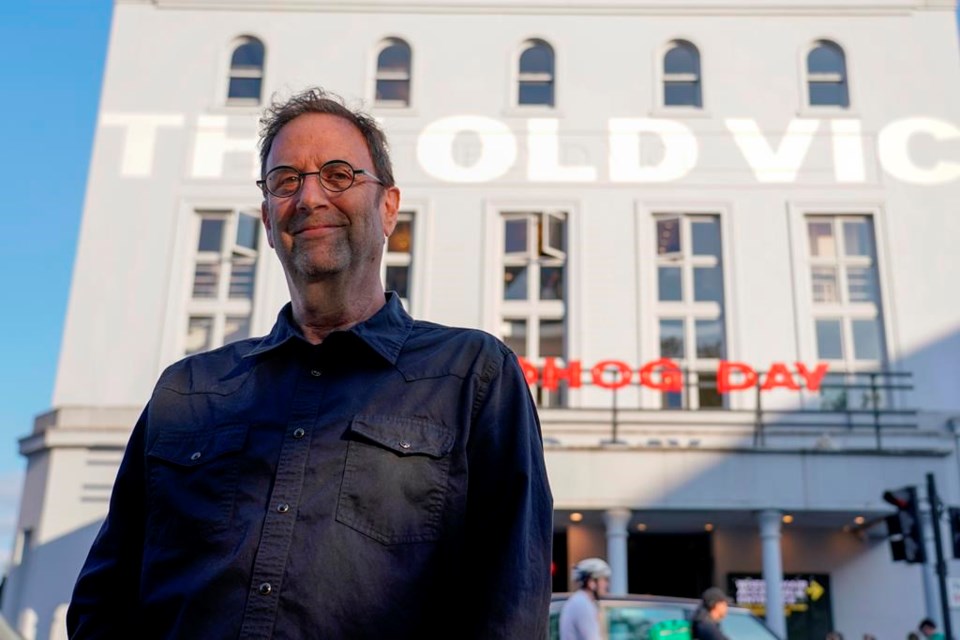LONDON (AP) â Well this is fitting: âGroundhog Dayâ is back. Again.
The story of a jaded weatherman fated to live the same day over and over began as a beloved movie, then became an award-winning stage musical. On Thursday it opens at Londonâs Old Vic Theatre, where it had its acclaimed original run in 2016.
For writer Danny Rubin, itâs the latest chapter in the three-decade journey of an idea that changed his life and added a new term to the dictionary: âGroundhog Day, noun: a situation in which the same usually negative or monotonous experiences occur repeatedly."
Rubin said he imagined weatherman Phil Connors â who wakes every morning to discover he's still covering a weather-forecasting rodent in Punxsutawney, Pennsylvania â as akin to Siddhartha, the ancient prince turned wandering monk who came to be revered as the Buddha.
âItâs about a human being going through lifeâs journey,â said Rubin, who came up with the original story and co-scripted the 1993 film with director Harold Ramis.
It also turned out to be a resonant metaphor for a modern-day ennui: fear of missing out, angst at getting stuck. The movie, starring a sardonic Bill Murray as Phil, quickly became a classic comedy in which generations of viewers have found deep â even spiritual â meaning. Phil canât get unstuck until he undergoes a personal transformation.
âItâs totally the existential situation,â said Rubin over coffee in London, where heâs helping tweak the musical for its new run. âNone of us know why weâre here, how we got here, or what weâre supposed to do. How is that any different from Phil?
âI think thatâs one of the reasons it appeals to people in a very personal way. Philâs transformation is not out of our reach. Itâs pretty clear that the worst day of Philâs life is also the best day of Philâs life, and the only difference is Phil."
Years later, Rubin realized the story wasnât finished with him. He considered turning it into a novel before settling on a musical. At one point, Broadway giant Stephen Sondheim expressed interest in adapting it. That didnât work out, but it was a vindication of the concept.
After a long search, Rubin teamed up with composer-lyricist Tim Minchin and director Matthew Warchus, the team behind Roald Dahl-inspired hit show âMatilda: The Musical.â
âWhen I met with Matthew, immediately (he) felt like the right partner,â said Rubin. âAnd then I met Tim and immediately felt like the right partner. They were like me in many ways that I appreciated, including the fact that we did the whole thing on a handshake and said, âLetâs keep the business people out of it until weâve written it completely and nailed down creatively the best show we can do.ââ
The musical is sharply funny and musically ebullient, but doesnât shy away from darkness as Phil, in despair at realizing he is essentially immortal, tries varied ways of killing himself. The Old Vic website warns ticket-buyers that âthe story ends happily but passes through some emotionally darker phases,â and includes phone numbers for mental health charities.
Rubin said the creative team agreed that âit really was a journey for Phil. And so if it had to go dark, it was going to go dark, and we werenât going to rely on platitudes.â
âGroundhog Dayâ stormed London in 2016 but had a relatively brief Broadway run the following year, despite scoring seven Tony Award nominations. One setback came when lead actor Andy Karl was injured early in the run, and, Rubin said the show was up against âmany really remarkably good showsâ in a bumper Broadway year.
But âGroundhog Dayâ keeps popping back up. The new production has made some tucks and trims that will make it easier to tour, but remains essentially the same show that won Olivier Awards for best new musical and best actor for Karl, who returns in the lead role.
It must be tempting to have another crack at Broadway, but Rubin said the team is proceeding by âbaby steps.â
âLetâs see how weâre received here,â he said.
Rubin, who lives in New Mexico and teaches screenwriting, cheerfully acknowledges that âGroundhog Dayâ has defined his career. A huge early success can be hard to live up to â Orson Welles never surpassed his first film, âCitizen Kaneâ â but he has no complaints.
âThe groundhog has been very good to me,â he said.
âThese things that we do, we like to think that theyâre going to make some kind of effect. And you never know how a career is going to go. I could have written âPorkyâs 3â or 4 or 5 and had to apologize to people when I meet them at a party and they say, âWhat do you do?â
âItâs nice to be associated with something thatâs so loved.â
Jill Lawless, The Associated Press



